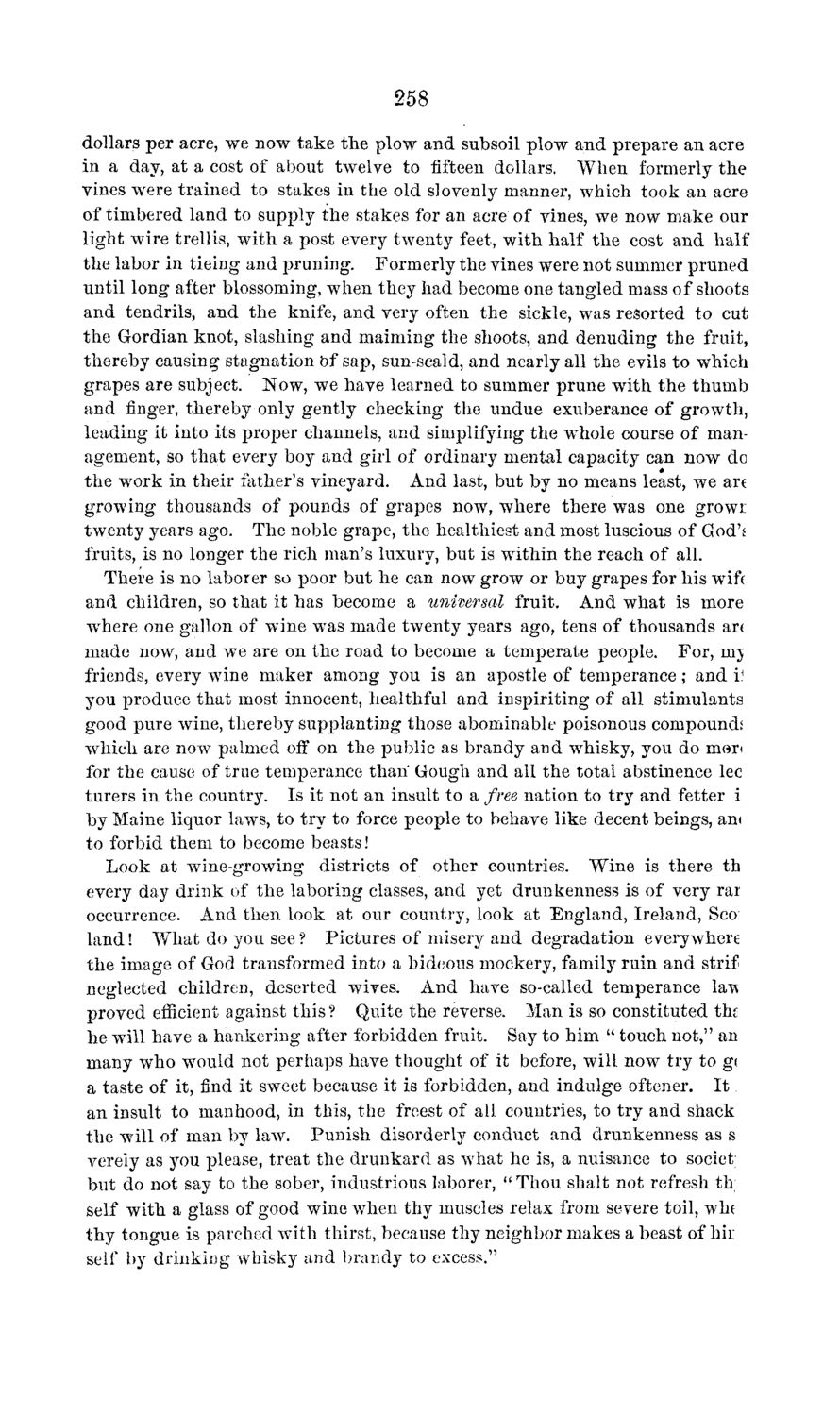| |
| |
Caption: Board of Trustees Minutes - 1869
This is a reduced-resolution page image for fast online browsing.

EXTRACTED TEXT FROM PAGE:
258 dollars per acre, we now take the plow and subsoil plow and prepare an acre in a day, at a cost of about twelve to fifteen dollars. When formerly t h e vines were trained to stakes in the old slovenly manner, which took an acre of timbered land to supply the stakes for an acre of vines, we now make our light wire trellis, with a post every twenty feet, with half t h e cost and half the labor in tieing and pruning. Formerly the vines were not summer pruned until long after blossoming, when they had become one tangled mass of shoots and tendrils, and the knife, and very often the sickle, was resorted to cut the Gordian knot, slashing and maiming the shoots, and denuding the fruit, thereby causing stagnation 'of sap, sun-scald, and nearly all the evils to which grapes are subject. Now, we have learned to summer prune with t h e t h u m b and finger, thereby only gently checking the undue exuberance of growth, leading it into its proper channels, and simplifying the whole course of management, so that every boy and girl of ordinary mental capacity can now dc t h e work in their lather's vineyard. And last, but by no means least, we are growing thousands of pounds of grapes now, where there was one growr twenty years ago. The noble grape, the healthiest and most luscious of God\< fruits, is no longer the rich man's luxury, but is within the reach of all. There is no laborer so poor but he can now grow or buy grapes for his wife and children, so that it has become a universal fruit. A n d what is more where one gallon of wine was made twenty years ago, tens of thousands are made now, and we are on the road to become a temperate people. For, mj friends, every wine maker among you is an apostle of temperance ; and i1. you produce that most innocent, healthful and inspiriting of all stimulants good pure wine, thereby supplanting those abominable poisonous compounds which are now palmed off on the public as brandy and whisky, you do men for the cause of true temperance than Gough and all the total abstinence lee turers in the country. Is it not an insult to a free nation to try and fetter i by Maine liquor laws, to try to force people to behave like decent beings, an< to forbid them to become beasts! Look at wine-growing districts of other countries. Wine is there th every day drink of the laboring classes, and yet drunkenness is of very rar occurrence. And then look at our country, look at England, Ireland, Sco l a n d ! W h a t do you see ? Pictures of misery and degradation everywhere the image of God transformed into a hideous mockery, family ruin and strif neglected children, deserted wives. And have so-called temperance la^v proved efficient against this ? Quite the reverse. Man is so constituted the he will have a hankering after forbidden fruit. Say to him " touch not," an many who wTould not perhaps have thought of it before, will now try to g< a taste of it, find it sweet because it is forbidden, and indulge oftener. It an insult to manhood, in this, the freest of all countries, to try and shack the will of man by law. Punish disorderly conduct and drunkenness as s vereiy as you please, treat the d r u n k a r d as what he is, a nuisance to societ but do not say to the sober, industrious laborer, " Thou shalt not refresh th self with a glass of good wine when thy muscles relax from severe toil, whe thy tongue is parched with thirst, because thy neighbor makes a beast of hii: self by d r i n k i n g whisky and brandy to excess."
| |